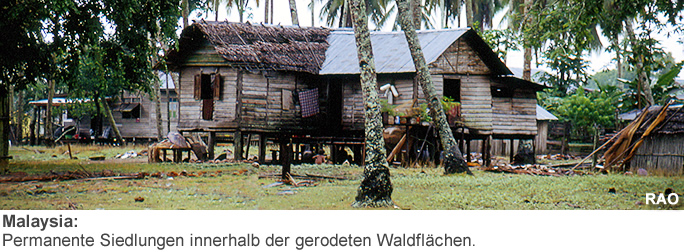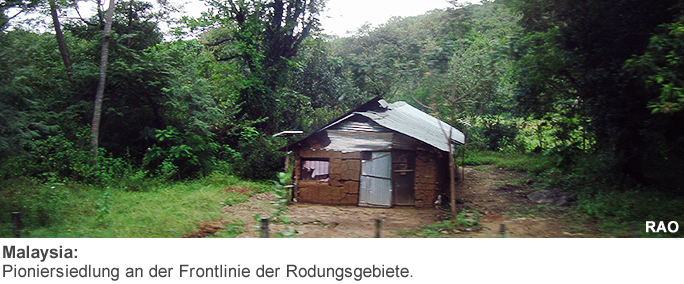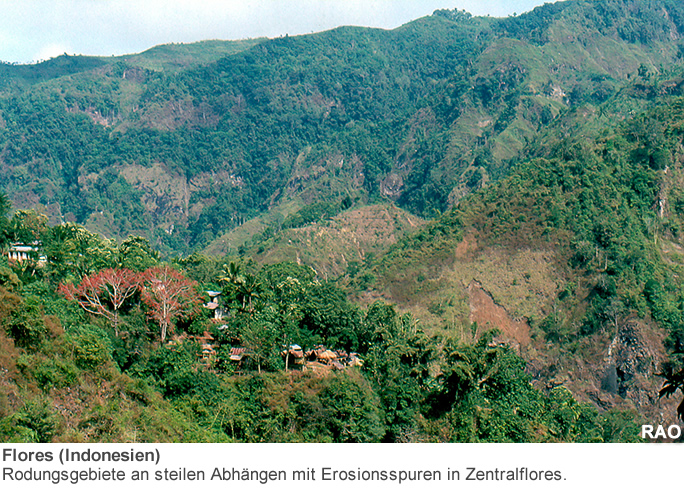 |
Tropische Zone Wirtschaft |
 |
Nutzung - Waldzerstörung |
 |
Tropische Zone Weitere Informationen |
|
| Tropischer
Regenwald: Waldzerstörung - keine Trendwende! |
 |
| 2004-2017: Äcker und Felder statt Regenwälder |
 |
Seit 2004 ging allein in Entwaldungshotspots eine Regenwaldfläche so gross wie Deutschland und Irland zusammen verloren
WWF: Gesetzliche Regelungen für Lieferketten können den Entwaldungsdruck massgeblich verringern
In nur etwas über einem Jahrzehnt wurden allein in 24 von Entwaldung besonders stark betroffenen Gebieten eine Fläche von 43 Millionen Hektar tropischen Regenwalds zerstört. Das entspricht ungefähr der Grösse von Deutschland und Irland zusammen. Ein Grossteil der Tropenwaldzerstörung geht auf das Konto der kommerziellen Landwirtschaft, die weitere Weide- und Ackerflächen für die Nahrungsmittelproduktion geschaffen hat. Zu diesem Ergebnis kommt dievom WWF veröffentlichte Studie "Deforestation Fronts: Drivers and Responses in a changing World". Dr. Susanne Winter, Programmleiterin Wald beim WWF Deutschland kommentiert: "Regenwälder sind eine Gesundheitsvorsorge für Mensch und Natur. Sie speichern Kohlenstoff, sind ein wichtiger Lebensraum für Tier- und Pflanzenarten und sind ein Bollwerk gegen Pandemien. Wir müssen daher dringend die Entwaldung aufhalten, sonst stoppt das Leben, wie wir es kennen."
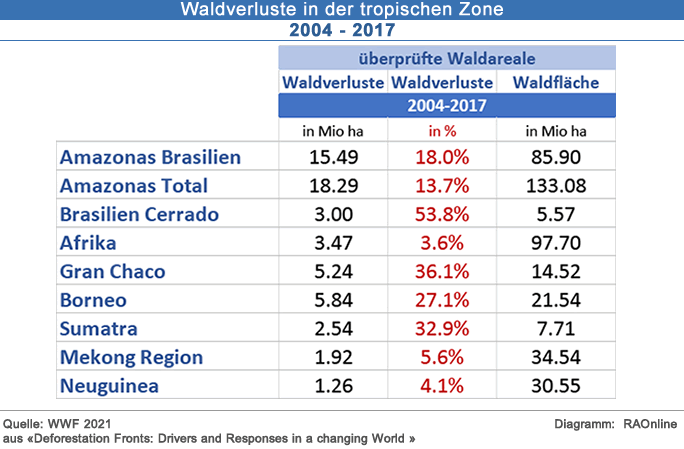 |
 |
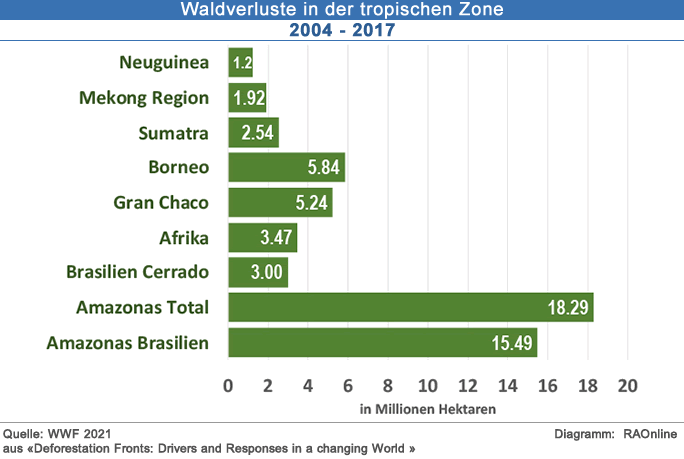 |
Der Bericht basiert auf Satellitendaten aus dem Zeitraum von 2004 bis 2017. Er identifiziert 24 Hotspots, an denen die Entwaldung extrem voranschreitet. Den grössten Verlust verzeichnet der Report im Amazonas (Brasilien, Kolumbien, Peru, Bolivien, Venezuela und Guyana) mit 18,3 Millionen Hektar zerstörtem Wald. Dahinter liegen die Wälder auf Borneo (Indonesien, Malaysia; 5,8 Millionen Hektar zerstörter Regenwald) und der Gran Chaco(Paraguay und Argentinien; 5,2 Millionen Hektar zerstörter Regenwald). Weitere Entwaldungsfronten liegen auf Madagaskar sowie Sumatra.
Fast die Hälfte (46 Prozent) der noch bestehenden Wälder in den Entwaldungshotspots ist zudem stark fragmentiert, also zum Beispiel durch Strassen oder Ackerflächen zerstückelt. Das macht den Wald anfälliger für Trockenheit sowie Feuer und vertreibt dort lebende Tierarten. Allein neun der 24 identifizierten Entwaldungshotspots befinden sich in Lateinamerika. Dort verzeichnete der WWF Living Planet Report einen dramatischen Rückgang der überwachten Wildtierbestände um 94 Prozent. Das sei kein Zufall, hält Winter fest: "Wälder sind wahre Schatzkammern der Artenvielfalt. Sie beherbergen 80 Prozent aller bekannten Tier- und Pflanzenarten ausserhalb der Ozeane." Nimmt die biologische Vielfalt in den Wäldern ab, sinkt aber auch die Fähigkeit der Wälder, Kohlenstoff zu speichern. Winter erklärt: "Wenn wir die Klimakrise nicht noch weiter anheizen wollen müssen wir die Wälder und die dort lebenden Arten schützen."
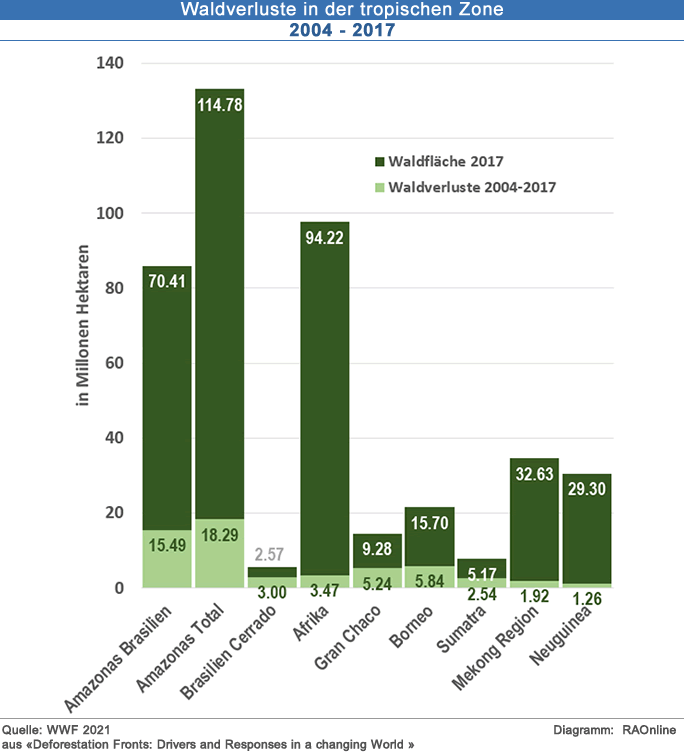 |
Auch wenn Wälder vor allem ausserhalb Deutschlands verschwinden, die Waldzerstörung geht auch auf das Konto von Unternehmen und Konsument:innen in Deutschland. Für den Anbau von Futtermittelsoja, Kakao und Rindfleisch, das in die EU importiert wird, wird oft Wald vernichtet. Rund ein Sechstel aller in der EU gehandelten Lebensmittel tragen zur Entwaldung in den Tropen bei. Winter sagt: "Statt nur mit dem Finger auf Regierungen und Landwirte in Entwaldungshotspots zu zeigen, müssen wir uns ebenfalls an die eigene Nase fassen. Die globale Landwirtschaft, der grösste Treiber der Entwaldung, produziert auch für den deutschen Markt. Mit einem Steak landet oftmals ein Stück Amazonas direkt auf unserem Teller. Denn selbst wenn die Rinder aus Deutschland kommen, werden sie meist mit importiertem Soja aus dem Amazonas gefüttert."
Der WWF fordert Politik, Unternehmen und Verbraucher/innen dazu auf, bei der Einfuhr, dem Verkauf und dem Konsum von Agrarrohstoffen und deren Produkten, die rasante Entwaldung der Tropen zu vermeiden. Die mächtigsten Hebel dafür sehen die Umweltschützer weiterhin bei der Politik. Laut WWF brauche es auf Bundes- und EU-Ebene dringend bessere und verbindliche Sozial- und Umweltstandards für die internationalen Handelsbeziehungen. Winter sagt: "Die Politik muss den Rahmen setzen und ein wirkungsvolles entwaldungsfreies EU-Lieferkettengesetz auf den Weg bringen. Waren, für deren Produktion Natur zerstört oder Menschenrechte verletzt wurden, dürfen nicht im Supermarktregal landen."
Laut dem Report wird die Waldzerstörung besonders in den Entwaldungshotspots noch weiter zunehmen. Das hätte auch schwerwiegende Folgen für die menschliche Gesundheit: Nach wissenschaftlichen Erkenntnissen stehen die Ausbrüche vieler Infektionskrankheiten in direktem Zusammenhang mit Waldrodungen. Winter sagt: "Eine intakte Natur ist von existenzieller Bedeutung für uns alle. Denn ist die Erde krank, werden es auch die Menschen. Wir müssen die Regenwälder besser schützen, sonst ist COVID-19 nur ein Vorgeschmack auf künftige Krisen."
Hintergrund: EU-Gesetz zu Entwaldungsfreien Lieferketten
Momentan wird auf EU-Ebene über ein Gesetz für Entwaldungsfreue Lieferketten beraten. Die EU-Kommission wird voraussichtlich im Mai einen Entwurf vorstellen. Der WWF fordert ein wirksames Gesetz gegen Entwaldung. Bei einer Bürgerbefragung hatten 1,2 Millionen EU-Bürger/innen diese Forderung bestätigt.
nach
oben
| WWF report: COVID-19 could give rise to radical change needed to stop deforestation once and for all |
 |
New report reveals an area roughly the size of California, totaling 43 million hectares, was lost to deforestation in just over a decade. WWF calling for COVID-19 to serve as a trigger for greater action to safeguard forests.
The COVID-19 crisis could open the door for the kind of radical changes that are essential to safeguard our forests and help prevent the next pandemic by putting a stop to deforestation once and for all, according to WWF, whose new report reveals that an area roughly five times the size of the United Arab Emirates was lost to deforestation in just over a decade in the tropics and subtropics alone.
The Deforestation fronts: Drivers and responses in a changing world report, published today, analysed 24 "deforestation fronts", or hotspots, across 29 countries in Asia, Latin America and Africa and found that more than 43 million hectares of forest were lost in these areas over a 13-year period. The report found that deforestation was taking place at the fastest rates in the following nine locations: the Brazilian Amazon and Cerrado, the Bolivian Amazon, Paraguay, Argentina, Madagascar, and Sumatra and Borneo in Indonesia and Malaysia.
"While the figures we're sharing today are alarming, the process of recovery from the COVID-19 pandemic may provide an opportunity for the kind of transformative changes that are essential to safeguard our forests - changes that have been identified as necessary for some time," says Fran Raymond Price, Forest Practice Lead at WWF International. "Forests covered about half of the Earth's land area 8,000 years ago, but today only 30% of land is forested, with deforestation continuing at shocking rates, particularly in places that are home to some of the world's most vulnerable communities and endangered wildlife.
"We urgently need to change our relationship with nature. As governments create policies to address the economic and social impacts of the global pandemic, we must address over-consumption and put greater value on health and nature rather than the current overwhelming emphasis on economic growth and financial profits at all costs. This isin humanity's best interests: the risk of new diseases emerging is higher in tropical forest regions that are experiencing land-use change, like many of the deforestation fronts, so if we don't tackle deforestation while we can, we could miss out on our chance to help prevent the next pandemic."
Commercial agriculture is the leading cause of deforestation globally, according to the report, particularly large-scale agriculture, with forested areas cleared to create space for livestock and to grow crops. Subsistence agriculture is a driver in some geographies, for example in Africa. In Asia, the main drivers are the expansion of plantations and commercial agriculture linked to global demand and domestic markets. Across all 24 fronts, infrastructure development, including the expansion of roads and mining operations, also contributes to deforestation.
In the Brazilian Cerrado, home to 5% of the planet's animals and plants, land has been rapidly cleared for cattle and soy production, resulting in the loss of a third (32.8%) of its forest area between 2004 and 2017.
Ana Mota da Silva, a member of the Afro-descendant Mumbuca community, who lives in the Cerrado, where deforestation rose by 13% in 2020, says: "Thinking about the Cerrado in 50 to 60 years' time makes me hurt. Knowing that our rivers are drying up, that so many trees are dying…the certainty that my sons, cousins, my descendants will not see what I have seen. I joke with my mum that we should take a picture of the Cerrado because soon it will only exist in pictures. We now face the Cerrado being devastated and us with it."
In the Cerrado and elsewhere, deforestation is a major factor leading to rising temperatures, which is why WWF wants combating deforestation to be recognised as a vital component of climate change mitigation.
"Stronger efforts to reduce deforestation and forest degradation must be part of the solution to the global climate change crisis," says Pablo Pacheco, WWF Forest Practice Lead Scientist. "The agriculture, forestry and land-use sectors account for about a quarter of all global greenhouse gas emissions, so by tackling forest loss, managing forests more sustainably and shifting to more sustainable food systems, we can cut down our emissions. There's no alternative if we want to achieve our global climate goals."
The Deforestation Fronts report urges citizens everywhere to pay their part in combating deforestation by protecting nature where they live, avoiding products linked to deforestation such as certain meat, soy and palm oil products by looking carefully at labels showing their provenance; and calling on their leaders to champion policies that halt deforestation and restore forests.
The report also calls for a number of urgent actions from governments, businesses and regulators, including:
Securing the rights of indigenous peoples and local communities to their lands and territories and strengthening local control of forests.
Securing the conservation of biodiversity-rich areas.
Ensuring products sourced from forests are produced and traded legally and sustainably.
Ensuring that companies' supply chains are as sustainable as possible and encouraging more companies and financial institutions to commit to zero deforestation.
Creating policies and legislation that ensure all imported forest commodities and products - and related finance - are free from deforestation and ecosystem conversion, and respect human rights.
The report tracked 24 deforestation fronts in the tropics and sub-tropics, covering an area of 710 million hectares, from 2004 to 2017. Nine of the 24 deforestation fronts are in Latin America, a region that has experienced a particularly dramatic decline in wildlife populations; eight are in Africa and seven in Asia-Pacific.
With world leaders scheduled to take critical decisions on the environment and climate this year, WWF is calling on them to secure a New Deal for Nature and People that sets nature on the path to recovery this decade, tackles climate change and safeguards the future of humanity. Action to tackle the drivers of biodiversity loss, such as deforestation, is essential to securing a nature-positive world.
*These deforestation fronts comprise over half (52%) of the total deforestation that took place in Latin America, sub-Saharan Africa, Southeast Asia and Oceania over the period 2004 to 2017. This suggests that, despite the importance of these fronts, deforestation is taking place on a widespread scale outside of these hotspots.
As world leaders join the One Planet Summit for Biodiversity online and in Paris on 11 January, WWF will be calling on participants to take unprecedented action on preventing deforestation as a key strategy for averting future pandemics.
WWF's report 'COVID 19': urgent call to protect people and nature', released in June 2020, showed that the environmental factors driving the emergence of zoonotic diseases are: land-use change leading to deforestation and conversion, the trade and consumption of high-risk wildlife, the expansion of agriculture and unsustainable intensification and animal production.
The 24 fronts identified in the Deforestation Fronts report are:
LATIN AMERICA
1 Amazon - Brazil
2 Amazon - Colombia
3 Amazon - Peru
4 Amazon - Bolivia
5 Amazon - Venezuela/Guyana
6 Gran Chaco - Paraguay/Argentina
7 Cerrado - Brazil
8 Chocó-Darién - Colombia/Ecuador
9 Maya Forests - Mexico/Guatemala
SUB-SAHARAN AFRICA
10 West Africa - Liberia/Ivory Coast/Ghana
11 Central Africa - Cameroon
12 Central Africa - Gabon/Cameroon/Republic of Congo
13 Central Africa - DRC/CAR
14 Central Africa - Angola
15 East Africa - Zambia
16 East Africa - Mozambique
17 East Africa - Madagascar
SOUTHEAST ASIA AND OCEANIA
18 Mekong - Cambodia
19 Mekong - Laos
20 Mekong - Myanmar
21 Sumatra - Indonesia
22 Borneo - Indonesia/Malaysia
23 New Guinea - Indonesia/PNG
24 Eastern Australia
About WWF
WWF is an independent conservation organization, with over 5 million supporters and a global network active in over 100 countries. WWF's mission is to stop the degradation of the Earth's natural environment and to build a future in which humans live in harmony with nature, by conserving the world's biological diversity, ensuring that the use of renewable natural resources is sustainable, and promoting the reduction of pollution and wasteful consumption.
nach
oben
| Weitere
Informationen |
 |
| RAOnline: Weitere Informationen über Länder |
| Links |
 |
 |
 |
Externe Links |
|


